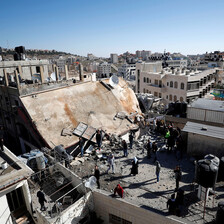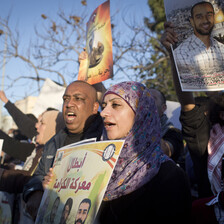The Electronic Intifada 27 October 2017
When a group of Palestinian dentists sang their national anthem at a professional gathering in Colombia in August, they did not expect the uproar that would follow.
It was not the first time the Arab Dentists Association in Israel had attended the dental implant training course in Bogotá.
The Palestinian association knew from previous experience that participating delegations from abroad would sing their respective national anthems at the graduation ceremony.
This year, as it has every time before, the Arab Dentists Association in Israel told the Colombian organizers that it refused to perform “Hatikva,” the Israeli national anthem, and would instead sing “Mawtini” (My Homeland), the lyrics written by the Palestinian national poet Ibrahim Tuqan in 1934.
“Mawtini” has long been a de facto Palestinian national anthem, its popularity enduring despite the Palestinian Authority replacing it with the song “Fida’i” in more recent years.
“We hold Israeli citizenship but our Palestinian identity has never been in doubt,” Fakhri Hassan, head of the Arab Dentists Association in Israel, told The Electronic Intifada.
“Refusing to sing the Israeli national anthem ‘Hatikva’ is a principled stance,” Hassan explained (the doctor is not a relative of this writer).
“It’s time for people to recognize, once and for all, that this is a Zionist anthem that does not represent Palestinians and is instead embedded in the erasure of our existence and identity and in the denial of Palestinians’ right to our own land.”
Backlash
This assertion of Palestinian self-determination provoked a fierce backlash in Israel.
The right-wing Channel 20 aired a report earlier this month claiming that “Arab-Israeli dentists” refused to sing the anthem of the country that paid for them to go to Colombia for training.
While one of the Channel 20 anchors correctly identified the song performed by the dentists as “Mawtini” by Ibrahim Tuqan, he read out lyrics to “Fida’i” translated to Hebrew, his colleague referring to it as the “hymn of the PLO” – the Palestine Liberation Organization.
The Arab Dentists Association in Israel called the Channel 20 segment an act of “incitement,” adding that it had not represented any Israeli body at the training course and didn’t receive government funding to participate.
A right-wing member of Israel’s parliament, the Knesset, suggested that the doctors shown on the Channel 20 video should no longer be permitted to practice dentistry in the country.
“As long as these Israeli Arab doctors feel that they are Palestinian and demand to sing the Palestinian anthem instead of the Israeli anthem, they should hold a Palestinian license rather than an Israeli one,” Oded Forer of the Yisrael Beiteinu party stated.
The Channel 20 video also prompted calls published on Facebook for Hassan to be fired from Clalit, a major public health service provider in Israel, and for the medical group to be boycotted until it does so.
Malak Athamneh, a dentist who participated in the training, told The Electronic Intifada: “We are proud of the stance we have taken but the Israeli response to this simple act has been shocking.”
She added: “Some say that if we don’t identify with ‘Hatikva’ we should leave this land, as if we owe our existence here to the state of Israel, as if we are supposed to feel grateful for living and working on our land and for our communities.”
Meanwhile, the Israel Dental Association has offered their Palestinian colleagues no support.
“I believe that this campaign is an attempt to dismantle and delegitimize our association because we successfully broke the monopoly and dominance of the Israel Dental Association,” Hassan said.
The Arab Dentists Association in Israel was established in 2000 in response to amendments to the constitution of the Israel Dental Association, Hassan said.
The founders, who include Hassan, argued that the Israel Dental Association excluded Palestinian dentists from leadership roles and that its policies discriminated against Palestinian dentists and patients.
The Palestinian minority in Israel – making up one-fifth of the state’s population – does not receive its fair share of government resources.
One of the first initiatives taken up by the association was to provide free dental treatment to Palestinian political prisoners in Israeli jails. The association also reaches out to economically disadvantaged Palestinian communities, giving free treatment to at-risk girls, Hassan said.
“We managed to reach a decision-making position in the dental health department [of the Israeli health ministry] in terms of budget allocation,” Hassan said.
Hassan said that his association meanwhile refuses to normalize Israel’s illegal annexation of East Jerusalem and its occupation of the Syrian Golan Heights by referring to colleagues in those places as Palestinian and Syrian, respectively.
This “also riles up the Israeli association,” he added.
Clout
One of the association’s most notable achievements was the founding of an advanced training center which offers courses for Palestinians who studied dentistry abroad to help them prepare for the Israeli licensing examination.
Such courses were previously conducted by Israeli companies or by the Israel Dental Association. The Palestinian association offered courses conducted in Arabic, rather than Hebrew, and charged half of the fees of its Israeli counterpart, according to Hassan.
It is this increase in influence and economic clout that, Hassan believes, explains the backlash against the association.
“The forms of persecution against Palestinians in Israel may differ from what they were during military rule but the objective remains quite similar,” said Hassan, whose working-class father was held under house arrest for 15 years over his activism in the Communist Party.
“The repression may be softer now, but it is no less intimidating.”
During the nearly two decades of military rule that followed the declaration of the state of Israel in 1948, Israeli police would repeatedly raid the Hassan family’s home in Mashhad, near Nazareth. This experience shaped Hassan’s political consciousness.
The doctor believes it is impossible to separate his profession from the reality of discrimination and occupation in the country.
“The message we try to convey when we refuse to sing ‘Hatikva’ or stand for it is that we oppose the state’s definition of itself as Jewish,” he said.
“It’s impossible [for the state] to be Jewish and democratic. This is a contradiction in terms.”
Budour Youssef Hassan is a Palestinian writer based in Jerusalem. Blog: budourhassan.wordpress.com





